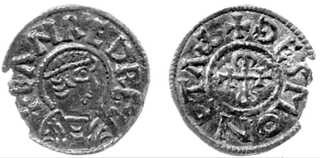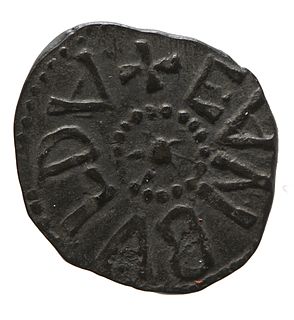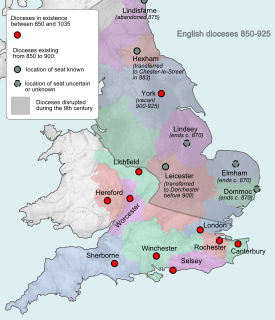
Year 796 (DCCXCVI) was a leap year starting on Friday of the Julian calendar. The denomination 796 for this year has been used since the early medieval period, when the Anno Domini calendar era became the prevalent method in Europe for naming years.

Coenwulf was the King of Mercia from December 796 until his death in 821. He was a descendant of a sibling of King Penda, who had ruled Mercia in the middle of the 7th century. He succeeded Ecgfrith, the son of Offa; Ecgfrith only reigned for five months, and Coenwulf ascended the throne in the same year that Offa died. In the early years of Coenwulf's reign he had to deal with a revolt in Kent, which had been under Offa's control. Eadberht Præn returned from exile in Francia to claim the Kentish throne, and Coenwulf was forced to wait for papal support before he could intervene. When Pope Leo III agreed to anathematise Eadberht, Coenwulf invaded and retook the kingdom; Eadberht was taken prisoner, was blinded, and had his hands cut off. Coenwulf also appears to have lost control of the kingdom of East Anglia during the early part of his reign, as an independent coinage appears under King Eadwald. Coenwulf's coinage reappears in 805, indicating that the kingdom was again under Mercian control. Several campaigns of Coenwulf's against the Welsh are recorded, but only one conflict with Northumbria, in 801, though it is likely that Coenwulf continued to support the opponents of the Northumbrian king Eardwulf.
Æthelbert II was king of Kent. Upon the death of his father Wihtred, the kingdom was ruled by his three sons, Æthelbert II, Eadberht I and Alric. Æthelbert seems to have outlived both of his brothers and later reigned jointly with his nephew Eardwulf. He died in 762, according to the Anglo-Saxon Chronicle. He seems to have left a son, Eadberht II.

Eanred was king of Northumbria in the early ninth century.
Eadberht I was king of Kent from 725 to 748. After his father, Wihtred of Kent died, he inherited the kingdom of Kent along with his two brothers Æðelberht II and Alric. Æðelberht II seems to have been the eldest and more dominant brother. Eadberht I died in 748, according to the Anglo-Saxon Chronicle. He left a son, Eardwulf, who succeeded as king jointly with his uncle.
Eanbald was an eighth century Archbishop of York.

Eanbald was an eighth century Archbishop of York and correspondent of Alcuin.
Eardwulf was King of Kent, jointly with Æðelberht II.
Eardulf of Lindisfarne was Bishop of Lindisfarne for 46 years between 854, following the death of his predecessor, and his own death in 899. He was chiefly responsible for removing the remains of St Cuthbert from Lindisfarne to protect them from Viking invasions, eventually resettling them in Chester-le-Street and temporarily running the see from there.
Eadwulf was king of Northumbria from the death of Aldfrith in December 704 until February or March of 705, when Aldfrith's son Osred was restored to the throne.
Eardwulf was king of Northumbria from 796 to 806, when he was deposed and went into exile. He may have had a second reign from 808 until perhaps 811 or 830. Northumbria in the last years of the eighth century was the scene of dynastic strife between several noble families: in 790, the then-king Æthelred I attempted to have Eardwulf assassinated. Eardwulf's survival may have been viewed as a sign of divine favour. A group of nobles conspired to assassinate Æthelred in April 796 and he was succeeded by Osbald: Osbald's reign lasted only twenty-seven days before he was deposed and Eardwulf became king on 14 May 796.
Osred II was King of Northumbria from 789 to 790. He was the son of Alhred and Osgifu, daughter of Eadberht.

Æthelred was king of Northumbria in the middle of the ninth century, but his dates are uncertain. N. J. Higham gives 840 to 848, when he was killed, with an interruption in 844 when Rædwulf usurped the throne, but was killed the same year fighting against the Vikings. Barbara Yorke agrees, and adds that Æthelred was the son of his predecessor, Eanred, but dates his death 848 or 849. D. P. Kirby thinks that an accession date of 844 is more likely, but notes that a coin of Eanred dated stylistically no earlier than 850 may require a more radical revision of dates. David Rollason accepts the coin evidence, and dates Æthelred's reign from c.854 to c. 862, with Rædwulf's usurpation in 858.

Rædwulf was king of Northumbria for a short time. His ancestry is not known, but it is possible that he was a kinsman of Osberht and Ælla.

Ælfwald, according to one tradition, reigned as king of Northumbria following the deposition of Eardwulf in 806. This information appears only in the anonymous tract De primo Saxonum adventu and in the later Flores Historiarum of Roger of Wendover. Roger states that Ælfwald had overthrown Eardwulf.

The Priory Church of St Mary and St Hardulph is the Church of England parish church of Breedon on the Hill, Leicestershire, England. The church has also been known as Breedon Priory and as the Holy Hill Monastery.
Eardwulf or Eardulf is an Anglo-Saxon male name. Notable people with the name include:
Eardwulf was a medieval Bishop of Rochester.
Eadred Lulisc or Eadred of Carlisle is the abbot of Carlisle recorded by the Historia de Sancto Cuthberto. The Historia gives the abbot central place in the election of Guthred as king of Northumbria by the Viking army based in Yorkshire, and that subsequently Eadred purchased land from him, using it to endow the bishopric of St Cuthbert. The Historia also related that he and Eardwulf, Bishop of Lindisfarne, moved the body of St Cuthbert away from its previous base at Lindisfarne, tried to take it to Ireland, but failed and took it back to the east, first to Crayke and then to Chester-le-Street.

The Empty Throne is the eighth historical novel in The Saxon Stories series by Bernard Cornwell, first published in October 2014. It is set in 10th-century Mercia and Dyfed.









